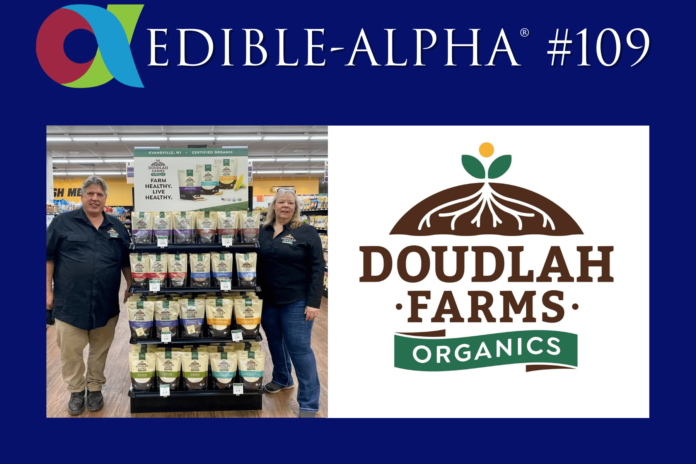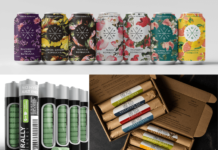
Subscribe: Apple Podcasts | Google Podcasts | Spotify | Email | TuneIn | RSS | More
In Edible-Alpha® podcast #109, Andy interviews Mark Doudlah, a fifth-generation farmer and owner of Doudlah Farms Organics in southcentral Wisconsin. The 1,625-acre certified-organic, regenerative farm grows 15 different crops for human consumption. Doudlah Farms Organics also has a value-added component, milling, packaging, and selling branded dry beans, seeds, and flours direct-to-consumer and at retail.
Mark actually started out as a conventional farmer, just like his father, Earl. But then in 2008, Earl was diagnosed with lymphoma, likely caused by lifelong exposure to chemical ag inputs. Realizing the environmental and human health hazards of conventional farming, Mark grew determined to do things differently—safely for the planet and people. So, to honor his dad, he transitioned 40 acres to organic.
This new way of farming had a steep learning curve, but Mark, along with wife Lucy and son Jason, was committed to figuring it out. They learned a lot over the next three years, working out best practices for planting, weed control, combining, cleaning, and storing. Then when Earl passed away in 2011, the Doudlahs began transitioning the rest of their acreage to organic and regenerative. Along the way, they’ve continually sought support and guidance from FFI, Rodale Institute, UW-Madison, MOSES, and other resources to help hone and grow their operations.
Today, along with carrying USDA Organic certification, Doudlah Farms Organics is certified by the Real Organic Project and is in the process of becoming Regenerative Organic Certified. The farm is also Yahara Pride Certified, which verifies its efforts to enhance soil and water quality. Mark explains why these measures are so important to truly regenerate the soil, protect surrounding ecosystems, and ensure safe food.
As for Doudlah Farms Organics’ consumer products business, Mark wishes he’d taken FFI training courses before writing his first value-added producer grant (VAPG). Our programs gave him a better understanding of various marketing channels, cash flow management, forecasting, and what it really takes to move a product from field to consumer. Now with more value-added experience under his belt, the business is growing steadily and expanding its retail footprint.
To wrap up, Andy and Mark discuss financing. Most banks, even ag specialists, don’t understand the nuances of organic and regenerative, let alone value-added, so it’s important to find one that does. Then before signing off, Mark shares his vision for Doudlah Farms Organics and his hope for combatting climate change.


